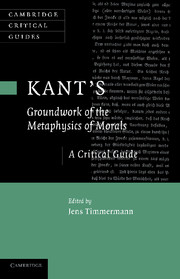Book contents
- Frontmatter
- Contents
- List of contributors
- List of translations and abbreviations
- Introduction
- 1 Ethics and anthropology in the development of Kant's moral philosophy
- 2 Happiness in the Groundwork
- 3 Acting from duty: inclination, reason and moral worth
- 4 Making the law visible: the role of examples in Kant's ethics
- 5 The moral law as causal law
- 6 Dignity and the formula of humanity
- 7 Kant's kingdom of ends: metaphysical, not political
- 8 Kant against the ‘spurious principles of morality’
- 9 Autonomy and impartiality: Groundwork III
- 10 Problems with freedom: Kant's argument in Groundwork III and its subsequent emendations
- 11 Freedom and reason in Groundwork III
- Bibliography
- Index
4 - Making the law visible: the role of examples in Kant's ethics
Published online by Cambridge University Press: 04 August 2010
- Frontmatter
- Contents
- List of contributors
- List of translations and abbreviations
- Introduction
- 1 Ethics and anthropology in the development of Kant's moral philosophy
- 2 Happiness in the Groundwork
- 3 Acting from duty: inclination, reason and moral worth
- 4 Making the law visible: the role of examples in Kant's ethics
- 5 The moral law as causal law
- 6 Dignity and the formula of humanity
- 7 Kant's kingdom of ends: metaphysical, not political
- 8 Kant against the ‘spurious principles of morality’
- 9 Autonomy and impartiality: Groundwork III
- 10 Problems with freedom: Kant's argument in Groundwork III and its subsequent emendations
- 11 Freedom and reason in Groundwork III
- Bibliography
- Index
Summary
INTRODUCTION: EXAMPLES IN PURE MORAL PHILOSOPHY
Nowhere is the stringency of Kant's Groundwork of the Metaphysics of Morals more evident than in his blunt statement that one could not ‘give worse advice to morality than by wanting to derive (entlehnen) it from examples’ (G IV 408). Was the sage of Königsberg oblivious to the power of example? Was he indifferent to the adage that it is always ‘personalities, not principles, that move the age’? The outspokenness of the message becomes even more apparent when Kant applies it to some of the most fundamental commitments of his largely Christian eighteenth-century readership. ‘Even the Holy One of the Gospel’, he remarks pointedly, is unable to serve as a defensible norm in ethics (G IV 408). A recent popular bumper sticker to the contrary, the question is not ‘What would Jesus do?’. Raising the religious ante still further, Kant next turns his sights on theists of all persuasions who look upon the deity as the ultimate criterion of moral norms: ‘But where do we get the concept of God as the highest good?’ (G IV 408–9). Even though Kant frequently claims to arrive at his own foundational moral principle simply by analysing ‘the moral cognition of common human reason (die gemeine Menschenvernunft)’ (G IV 403; cf. IV 402), the so-called ‘divine command theory of ethics’, according to which our moral duties are simply what God commands (subscribed to by a strong majority of people in all times and places, and hence still today the planet's dominant theory of normative ethics) is quickly rejected.
- Type
- Chapter
- Information
- Kant's 'Groundwork of the Metaphysics of Morals'A Critical Guide, pp. 63 - 81Publisher: Cambridge University PressPrint publication year: 2009
- 5
- Cited by

